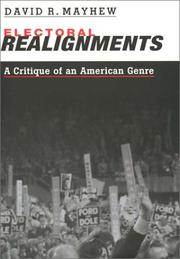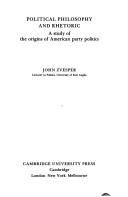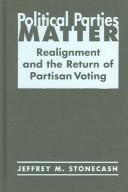| Listing 1 - 8 of 8 |
Sort by
|
Book
ISBN: 0520026500 9780520026506 Year: 1975 Publisher: Berkeley University of California press
Abstract | Keywords | Export | Availability | Bookmark
 Loading...
Loading...Choose an application
- Reference Manager
- EndNote
- RefWorks (Direct export to RefWorks)

ISBN: 1281722294 9786611722296 0300130031 9780300130034 9780300093360 0300093365 9781281722294 6611722297 Year: 2002 Publisher: New Haven, CT : Yale University Press,
Abstract | Keywords | Export | Availability | Bookmark
 Loading...
Loading...Choose an application
- Reference Manager
- EndNote
- RefWorks (Direct export to RefWorks)
The study of electoral realignments is one of the most influential and intellectually stimulating enterprises undertaken by American political scientists. Realignment theory has been seen as a science able to predict changes, and generations of students, journalists, pundits, and political scientists have been trained to be on the lookout for "signs" of new electoral realignments. Now a major political scientist argues that the essential claims of realignment theory are wrong-that American elections, parties, and policymaking are not (and never were) reconfigured according to the realignment calendar. David Mayhew examines fifteen key empirical claims of realignment theory in detail and shows us why each in turn does not hold up under scrutiny. It is time, he insists, to open the field to new ideas. We might, for example, adopt a more nominalistic, skeptical way of thinking about American elections that highlights contingency, short-term election strategies, and valence issues. Or we might examine such broad topics as bellicosity in early American history, or racial questions in much of our electoral history. But we must move on from an old orthodoxy and failed model of illumination.

ISBN: 0521213231 9780521213233 Year: 1977 Publisher: Cambridge London [etc.] Cambridge University Press
Abstract | Keywords | Export | Availability | Bookmark
 Loading...
Loading...Choose an application
- Reference Manager
- EndNote
- RefWorks (Direct export to RefWorks)
Political parties --- History --- -Parties, Political --- Party systems, Political --- Political party systems --- Political science --- Divided government --- Intra-party disagreements (Political parties) --- Political conventions --- -History --- United States --- Political parties - United States - History
Book
ISBN: 9780521708876 9780511805424 9780521882309 0511595395 9780511595394 9780511651380 0511651384 9780511593468 0511593465 051180542X 0521882303 0521708877 0511698976 9780511698972 1107199980 9781107199989 0511592531 9780511592539 Year: 2009 Publisher: Cambridge ; New York : Cambridge University Press,
Abstract | Keywords | Export | Availability | Bookmark
 Loading...
Loading...Choose an application
- Reference Manager
- EndNote
- RefWorks (Direct export to RefWorks)
Dynamics of American Political Parties examines the process of gradual change that inexorably shapes and reshapes American politics. Parties and the politicians that comprise them seek control of government in order to implement their visions of proper public policy. To gain control parties need to win elections, and winning elections requires assembling an electoral coalition that is larger than that crafted by the opposition. Uncertainty rules and intra-party conflict rages as different factions and groups within the parties debate the proper course(s) of action and battle it out for control of the party. Parties can never be sure how their strategic maneuvers will play out, and, even when it appears that a certain strategy has been successful, party leaders are unclear about how long apparent success will last. Change unfolds slowly, in fits and starts.
Political parties --- History --- United States --- Politics and government --- History. --- Social Sciences --- Political Science --- Political parties - United States - History --- United States - Politics and government - 1865-1933 --- United States - Politics and government - 20th century --- United States - Politics and government - 2001-2009
Book
ISBN: 0527118001 9780527118006 Year: 1979 Publisher: Millwood KTO Press
Abstract | Keywords | Export | Availability | Bookmark
 Loading...
Loading...Choose an application
- Reference Manager
- EndNote
- RefWorks (Direct export to RefWorks)
Compromise of 1850 --- Fugitive slave law of 1850 --- Wilmot proviso, 1846 --- Political parties --- History --- United States --- Politics and government --- 1815-1861 --- Slavery --- Antislavery movements --- Democratic Party (U.S.) --- Political participation --- Whig Party (Great Britain) --- Free-Soil Party --- Massachusetts --- Ohio --- New York (State) --- Political parties - United States - History --- United States - Politics and government - 1841-1845 --- United States - Politics and government - 1845-1849

ISBN: 1588263940 158826369X 9781588263940 9781588263698 Year: 2006 Publisher: Boulder London L. Rienner
Abstract | Keywords | Export | Availability | Bookmark
 Loading...
Loading...Choose an application
- Reference Manager
- EndNote
- RefWorks (Direct export to RefWorks)
Party affiliation --- Political parties --- Voting --- Partis politiques --- Vote --- History. --- Adhésion --- Histoire --- History --- Adhésion --- United States --- Party affiliation - United States --- Party affiliation - United States - History --- Political parties - United States --- Political parties - United States - History --- Voting - United States --- Voting - United States - History
Book
ISBN: 0871875136 9780871875136 Year: 1990 Publisher: Washington Congressional quarterly
Abstract | Keywords | Export | Availability | Bookmark
 Loading...
Loading...Choose an application
- Reference Manager
- EndNote
- RefWorks (Direct export to RefWorks)
Elections --- Political parties --- History. --- -Political parties --- -#KVHA:Politiek; Verenigde Staten --- #KVHA:American Studies --- Parties, Political --- Party systems, Political --- Political party systems --- Political science --- Divided government --- Intra-party disagreements (Political parties) --- Political conventions --- Electoral politics --- Franchise --- Polls --- Politics, Practical --- Plebiscite --- Political campaigns --- Representative government and representation --- History --- #KVHA:Politiek; Verenigde Staten --- Elections - United States - History. --- Political parties - United States - History.
Book
ISBN: 1441903658 1493900889 9786612509858 1282509853 1441903666 Year: 2009 Publisher: New York : Springer Science,
Abstract | Keywords | Export | Availability | Bookmark
 Loading...
Loading...Choose an application
- Reference Manager
- EndNote
- RefWorks (Direct export to RefWorks)
"In this caustic, irreverent book, James T. Bennett reveals how regulation of the political system is used to keep the ‘ins’ in and the ‘outs’ out. The United States has benefitted from the separation of church and state: Not Invited to the Party demonstrates how the country could benefit from a wall of separation between political parties, campaigns, and state." Brad Smith, Professor of Law, Capital University, and former Chairman, Federal Election Commission For many participants and pundits, the 2008 U.S. Presidential election was a watershed event, representing unprecedented public involvement in the political process. Yet for third-party candidates and supporters, it was yet another reminder of how the dominant parties have co-opted the system to their advantage, crippling potential challengers and limiting voter choice. In Not Invited to the Party, James Bennett reveals how the Democrats and Republicans have contributed to an array of laws, subsidies, and programs that have secured their lock on American politics. The Founding Fathers, as has been generally forgotten, distrusted political parties. Nowhere in the U.S. Constitution are parties mentioned, much less given legal protection or privilege. This provocative book traces how by the end of the Civil War the two parties had cemented their position and subsequently influenced a range of policies developed to protect their duopoly. For example, Bennett examines how the Federal Election Campaign Act of 1971, which was sold to the public as a nonpartisan act of good government reformism, actually reinforced the dominance of the two parties. While focused primarily on the American experience, the book also considers the prevalence of two-party systems around the world (especially in emerging democracies) and the widespread contempt with which they are often viewed. Featuring incisive commentary on the 2008 election, a foreword by third-party iconoclast, Ralph Nader, and an afterword by Libertarian National Committee Chairman, William Redpath, the book considers the potential for achieving truly radical reform toward opening the field to vigorous, lively, contentious third-party candidacies. Not Invited to the Party is an important contribution to any discussion of the impact of party politics and the prospects for achieving effective representation. James T. Bennett is Eminent Scholar and William P. Snavely Professor of Political Economy and Public Policy at George Mason University and Director of The John M. Olin Institute for Employment Practice and Policy. He is the author of numerous scholarly articles and over a dozen books, including From Pathology to Politics, Unhealthy Charities, and The Politics of American Feminism. In 1780 John Adams presciently argued that the "division of the republic into two great parties . . . is to be dreaded as the greatest political evil." Despite record turnouts for the 2008 presidential election, Adams’ fears have been realized. What would the Founding Fathers say now? "There is much to ponder in this book. It makes one wonder just how the voters, given the ultimatum that only one of two candidates — if that — can win the elections — can ever escape their chattled desire to vote for "winners" while they — the people — keep losing." From the Foreword by Ralph Nader "A carefully researched and highly readable book that shows how federal, state, and local governments have enacted laws, regulations, and subsidies that discriminate in favor of the Democratic and Republican parties and virtually prohibit challenges by independent parties and candidates. The unfortunate result is limited choice in the political arena. This book is essential reading for anyone interested in political competition and public policy." Walter E. Williams, John M. Olin Distinguished Professor of Economics, George Mason University "Finally, a book that exposes the reality that U.S. elections are substantially less free and less meaningful than elections in most other developed nations. Professor Bennett, an economist, has given us a book that should have emerged long ago from the ranks of political scientists... [A]n interesting and very well-written study full of insights into the election process." Richard Winger, Editor, Ballot Access News "James Bennett combines a detailed historical analysis of the rise of the two party system with the insights of the public choice school of economics to explain how the American people are ill-served by laws that limit their choices at the ballot box. Every American looking for ways to increase voter participation and open up the political process to all points of view should read this important book." Norman Kirk Singleton, Legislative Director, Congressman Ron Paul.
Party affiliation -- United States -- History. --- Political parties -- United States -- History. --- Third parties (United States politics) -- History. --- Political parties --- Party affiliation --- Third parties (United States politics) --- Political Science - General --- Political Rights - U.S. --- Political Science --- Government - U.S. --- Law, Politics & Government --- History --- Public administration --- Political science. --- History. --- Political Science and International Relations. --- Political Science. --- History, general. --- Annals --- Auxiliary sciences of history --- Administration --- Civil government --- Commonwealth, The --- Government --- Political theory --- Political thought --- Politics --- Science, Political --- Social sciences --- State, The
| Listing 1 - 8 of 8 |
Sort by
|

 Search
Search Feedback
Feedback About UniCat
About UniCat  Help
Help News
News